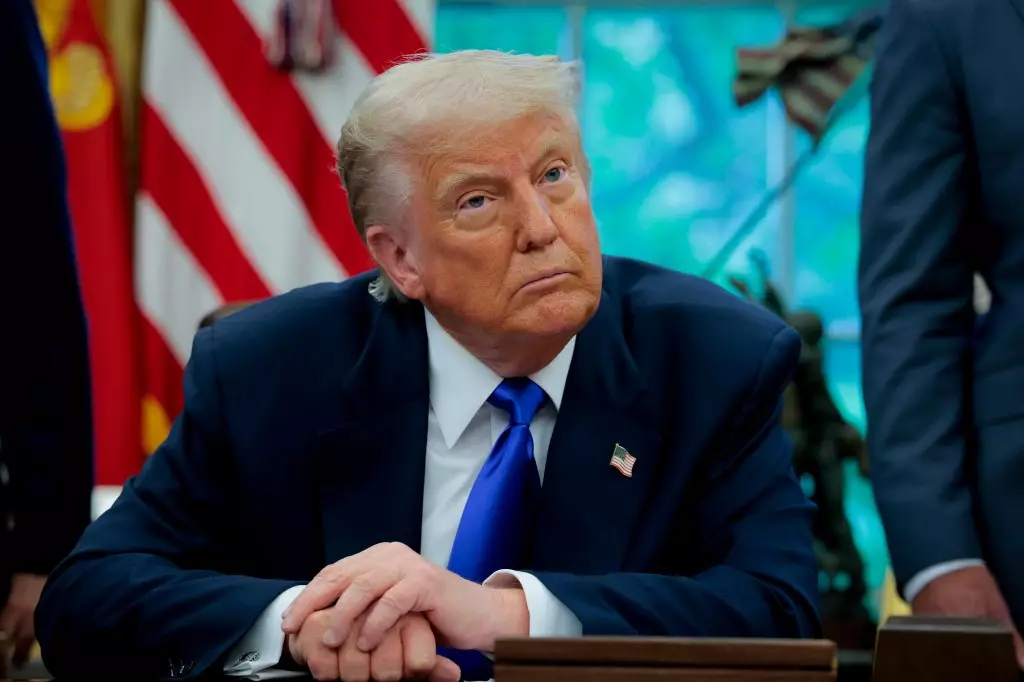As a public figure, President Donald Trump has consistently captured attention, not just for his policies but for the puzzling language he employs. Recently, remarks regarding dolls and girls made headlines, showcasing how seemingly innocuous topics can quickly descend into absurdity. While intending to illustrate economic concerns amid a threatening trade war, Trump’s foray into the world of dolls was anything but enlightening. Instead, it stirred up confusion and warranted satire, especially from comedian John Oliver on Last Week Tonight.
In a bizarre attempt to convey his point, Trump suggested that girls might require between two to five dolls, rather than the extravagant numbers often mentioned, such as 30 or 37. This metaphor, however misplaced, led Oliver to rightfully express his discomfort: “Every single way this man refers to girls makes my skin want to turn inside out.” This visceral reaction isn’t just a personal sentiment—it speaks to a larger issue of how language can underestimate the intellect and maturity of young girls. By trivializing their experiences through such ridiculous comparisons, Trump reveals a disconnect that borders on condescension.
Decoding the Humor of Miscommunication
Oliver’s brilliant comedic take on this matter extends beyond mere criticism. He engages the audience by imagining various absurd scenarios where Trump continues to elevate the ages and numbers in his doll metaphor. Whether it’s a “45-year-old girl” who’s “still young at heart” or the nonsensical tally of dolls that includes references to pop culture such as “12 Angry Men,” the humor isn’t just in the delivery but in the underlying truth: this type of communication is not only bizarre but also reflects a misunderstanding of the subject matter. The triviality of discussing toys while dealing with significant economic challenges underlines a disturbing flippancy associated with Trump’s presidency.
Moreover, Oliver’s remarks regarding Trump’s interactions with young women are showing a stark reality. When making suggestions about dolls at ages that clearly deviate from normal adolescent interests, one must wonder what kind of cultural lens Trump is viewing the world through. He casually moves from talking about 11-year-olds to 15-year-olds, underscoring the absurdity of his statements. Oliver’s pointed jab at Trump’s past associations only serves to heighten the discomfort surrounding these comments. The implication is clear: engaging in trivial discourse dismisses the seriousness of historical contexts.
Satirical Commentary on Broader Issues
In this same segment, Oliver didn’t just focus on the doll debacle; he took swipes at other figures, such as Jeanine Pirro, humorously dubbing her the “meanest drunk aunt” of political commentary. This clever quip adds depth to Oliver’s satire, as he navigates through the chaos of contemporary political dialogue. The layer of humor contrasts sharply with the alarming trends in political rhetoric, illustrating the disarray that permeates beyond just Trump’s remarks.
Further, he tackled the recent election of Robert Prevost as Pope Leo XIV, cleverly intertwining it with Trump’s controversial trade war. The comparison resonates; just as the choice in religious leadership raises eyebrows, so too does the volatile nature of Trump’s policies. Oliver captures the essence of the absurdity in contemporary politics—how both figures symbolize a crumbling dialogue and the pressing crises that seem to slip beneath the surface of outlandish conversations.
In essence, Oliver’s critique transcends mere punchlines; it challenges us to scrutinize the language of leadership and the implications behind it. Rather than witnessing a sober reflection on economic strife, we are faced with a whimsical discussion on dolls—a clear call for a more serious discourse in a dire time.
